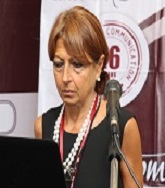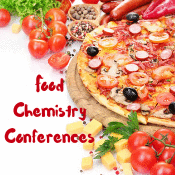Organizing Committee Member

Adele Maria Muscolo
Professor
Mediterranea University of Reggio Calabria
Italy
Biography
Education 1980- High school diplomas in scientific studies. 1985 - Graduated in Biological Sciences (MSc), at the University of Messina, Faculty of Science. 1985-1987- Practice attendance at biological laboratory of the “Riuniti†hospital, Reggio Calabria, Italy. 1987- Professional qualification with honours, to exercise the biology profession, Biology Faculty, Messina University, Sicily, Italy. 1987, 1988 - Fellowship with grant at the “Institute of Cybernetic, on signal transduction pathway. Arco Feliceâ€Â, Naples. 1988- PhD in Food Science at the Policlinic “Federico IIâ€Â, University of Naples. Studies and researches performed at the “Policlinic, Federico II University of Naples, Italy (output scientific papers, published in national journals). Professional position 1988- Researcher at the Department of Agrochemistry and Agrobiology of the Agricultural Faculty “Mediterranea†University of Reggio Calabria, Italy. Since 2001- Associate professor of Pedology, Biochemistry and Soil Ecology in the Agricultural Faculty of “Mediterranea†University of Reggio Calabria, Italy. Since 2010 –Eligible for Full professor position in Soil Chemistry and Biochemistry, and Soil Ecology, July 2010-Bolzano University Italy Since December 2016 Full Professor of Soil Ecology and Soil Chemistry in charge to Mediterranea University of Reggio Calabria Teaching experience Course taught 1993-1994, 1994-1995, 1995-1996, 1996-1997 - Courses in Forestry Soil Chemistry 1995-1996, 1996-1997, 1997-1998 - Courses in Pedology 1997-1998, 1998-1999, 1999-2000, 2000-2001 -Courses in Plant Biochemistry 1998-1999, 1999-2000, 2000-2001 Courses in Pedology: theory and practice 2001-2002- Courses in Pedology, Plant Biochemistry and Forestry Soil Chemistry 2002-2003, 2003-2004- Courses in Pedology, Plant Biochemistry Since 2004- Courses in Forestry Soil Chemistry and Soil Ecology Seminars on specific interest of Agricultural Chemistry 1995- Course on Food and Environment organized by the National Order of Biologists and Calabria Region. 1996- Chemistry lectures in professional training course for operators of "Food Biotechnology Fund" organized from ENAIP, Calabria Region. 1997 - Teaching in the course, for training technical operator in the laboratory. 2000- Lecture titled "Biological activity of humic matter" at the Centre for Research in Plant Sciences, Faculty of Health and Life Sciences, Bristol University (UK). 2001- Lectures in "Biochemistry and Physiology, Geology and Pedology", in the International Master,II Level in collaboration with the Ecole Nationale Supérieure d'Architecture de Paris la Villette at “Mediterranea" University of Reggio Calabria. 2005- Course in Soil Chemistry, (4 CFU), for Technical Training Education Course supported by Calabria Region IFTS titled “Senior technician for the management of agro-environmental areaâ€Â, held at the office of C.R.A. (Lamezia Terme, CZ). 2006-2007- Soil Chemistry (60 hours) at the Secondary Teacher Training School (SSIS)-AA Cycle VIII (UNICAL, Cosenza, Italy). 2007-2008- Soil Chemistry (60 hours) lessons at the Specialization School for Secondary Teacher Training School (SSIS)-IX AA Cycle 2007-2008 (UNICAL Cosenza). 2008- Pedology (10 hours) lessons in the Training (Project FIXO) course for "expert in technological transfer innovation, design and turf management in Mediterranean environments", held at the Faculty of Agriculture of Reggio Calabria, Italy. Since 2008- Lecturer and trainer in the School of Doctoral Research “PhD in cultivation and defense of tropical and subtropical crops". Coordinator: Prof. Rocco Zappia, Department of Agriculture and Forest System Management. 2009- “Soil quality: assessment and management" lessons in the International Master Level "Technological innovation and sustainability of Mediterranean olive" at the Mediterranean University of Reggio Calabria, Italy. Since November 2011- Member of the teaching committee of PhD School "PhD Science and technology for forestry and environment management. Tuscia University, Viterbo, Italy Coordinator: Prof. Rosanna Bellarosa Department of Agriculture, Forests, Nature and Energy (D.A.F.N.E.) Tuscia University, Viterbo, Italy. Since 1988- She follows students in the preparation of thesis and in the internship and she is tutor and co-tutor of Master, and PhD thesis.
Research Area
Research field Since 1988 my research investigates connections between soil chemistry, biochemistry and function in regulating ecosystem-level processes. Because I focus on quantifiable material common to many ecosystems, my interests are not limited to any one environment. Consequently, the setting for my research includes forests, managed ecosystems (e.g. tree nurseries), grasslands, as well as urban environments, which welcomes collaborations across a range of disciplines. My research is hypothesis-driven and tends toward experimental discovery, as opposed to descriptive observation. The goal is to conduct research to provide innovative solutions for soil management that will increase profitable crop production and ensure soil and environmental quality. Knowledge derived from my research activities is disseminated to the scientific community and industry, and used to develop management guidelines, recommendations and tools for sound soil management. Interests • Dynamic and evolution of organic matter in forest soil and effects of humic substances separated in fractions (different molecular weight and composition) on seed germination, plant growth and metabolism. Relationship between soil organic matter (labile and recalcitrant C fractions) and soil biodiversity in driving soil ecosystem functioning. • Role of water soluble phenolic compounds (WSP) in influencing the accumulation and availability of soil nutrients and the rate of nutrient cycling in forest ecosystem. Effects of WSP on seed germination, seedling growth and metabolism. • Effects of forest management, waste disposal and environmental constraints on soil properties, organic matter trend, microbial biomass, nutrient cycles and enzyme activities. • Identification of biochemical markers to be routinely used and applicable to most ecosystems as early warning indicators of soil quality changes. • Effects of abiotic stress (salinity, drought and heat) on seed germination, seedling growth and metabolism. Studies on the physiological biochemical and adaptive response of plants to different environmental constraints, considering their productive response and effects on soil properties. Halophytes used as crops, including bioenergy, for the restoration and rehabilitation of salinized or contaminated soils. • Use of polluting recalcitrant agricultural wastes (olive wastes and citrus pulps), and inorganic sulfur obtained from the residues of the desulfurization of natural gas and oil, as fertilizers for a sustainable recovery of saline and alkaline soils, and for an eco-friendly agriculture. • Relationship between microbial ecology and plant physiology. Plants respond to environmental factors by altering growth and longevity of fine roots, which, in part, control the amount and types of organic substrates available for microbial metabolism in soil. Changes in belowground plant growth influence the composition and function of soil microbial communities. My work is focused on understanding the link between plant and microbial activity within terrestrial ecosystems, and the influence climate change may have on these dynamics.
